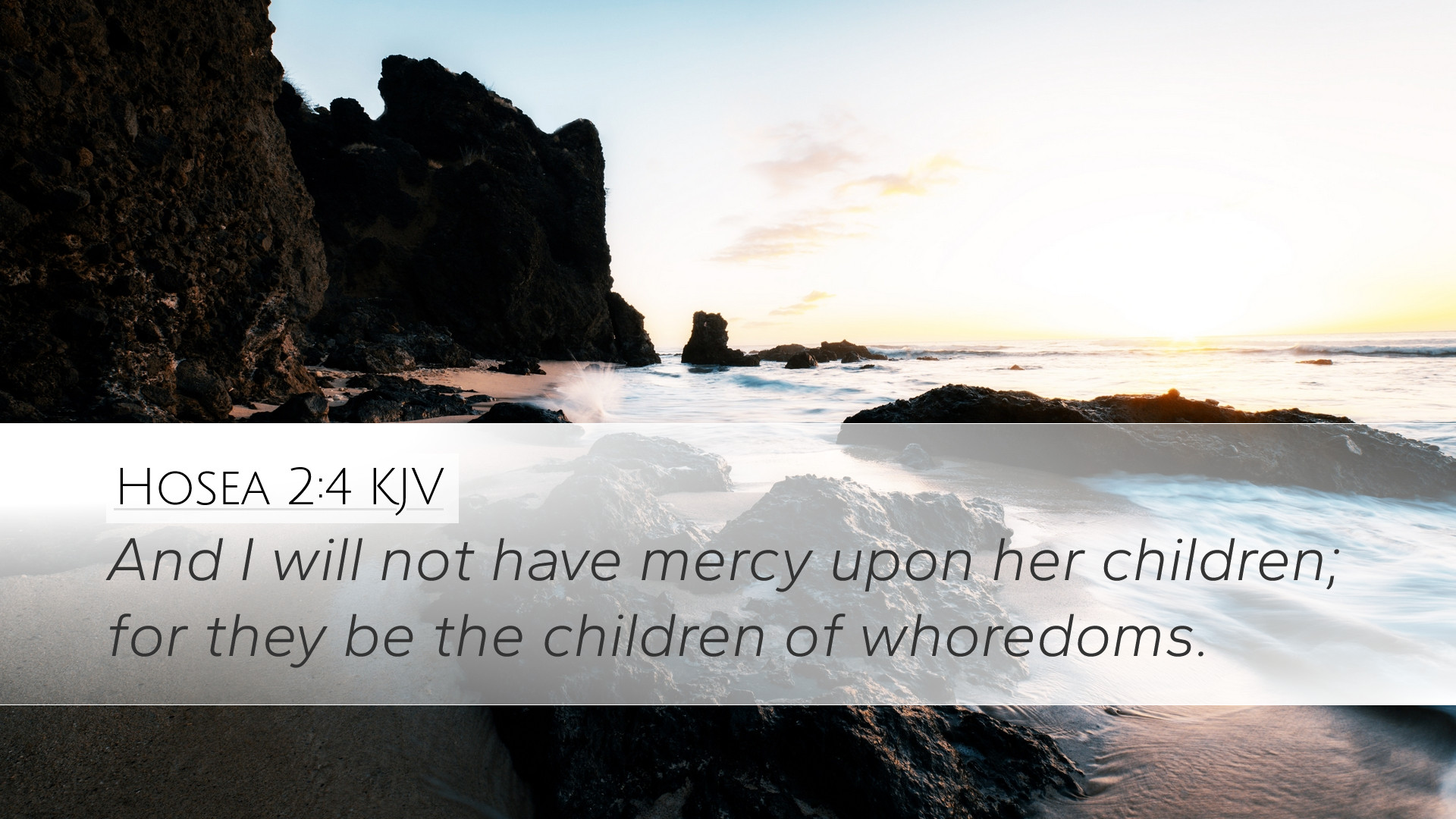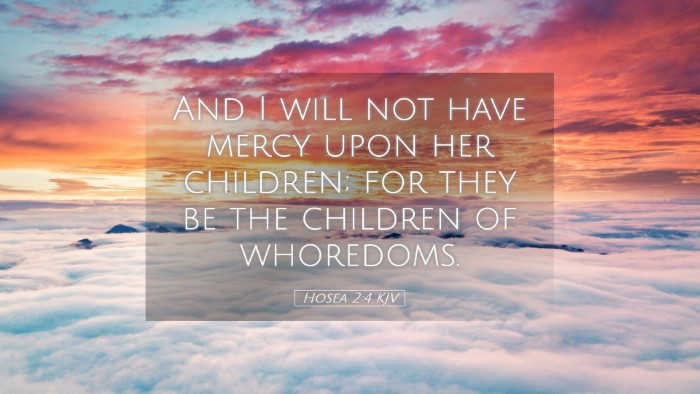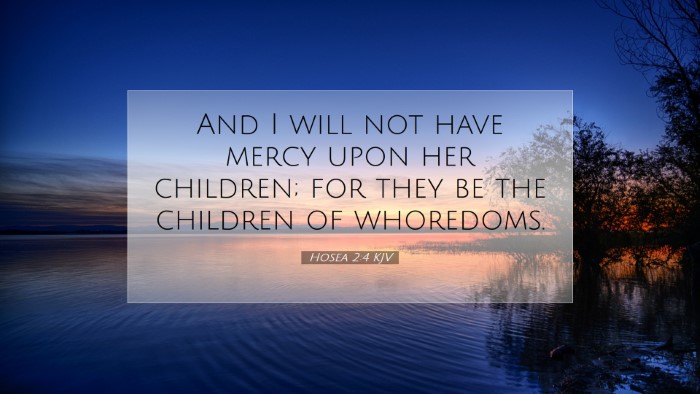Old Testament
Genesis Exodus Leviticus Numbers Deuteronomy Joshua Judges Ruth 1 Samuel 2 Samuel 1 Kings 2 Kings 1 Chronicles 2 Chronicles Ezra Nehemiah Esther Job Psalms Proverbs Ecclesiastes Song of Solomon Isaiah Jeremiah Lamentations Ezekiel Daniel Hosea Joel Amos Obadiah Jonah Micah Nahum Habakkuk Zephaniah Haggai Zechariah MalachiHosea 2:4
Hosea 2:4 KJV
And I will not have mercy upon her children; for they be the children of whoredoms.
Hosea 2:4 Bible Commentary
Bible Commentary on Hosea 2:4
"And I will not have mercy upon her children; for they be the children of whoredoms." - Hosea 2:4
Introduction
The book of Hosea is a profound prophetical work that illustrates God's relationship with Israel, using the metaphor of marriage to convey His covenantal love and Israel's unfaithfulness. Hosea 2:4 reflects an intense moment in this narrative, highlighting God's judgement upon Israel's spiritual infidelity. This commentary synthesizes insights from prominent public domain scholars, applying their insights to enrich our understanding of this verse.
Contextual Background
Historically, Hosea prophesied during a tumultuous period in Israel's history, where rampant idolatry and societal immorality characterized the nation. The prophetic message centers on themes of love, judgement, and ultimately restoration.
Hosea's personal life, particularly his marriage to Gomer, serves as an allegory for Israel's relationship with God. The prophet's experiences mirror the pain of divine betrayal due to Israel's unfaithfulness.
Analysis of Hosea 2:4
The verse presents a pivotal declaration of divine judgement, wherein God expresses His intention to withdraw mercy from the children of Israel due to their whoredoms. Let's explore this passage in detail through the lens of several commentators.
Matthew Henry's Commentary
Henry emphasizes the emotional distress of God regarding Israel's idolatry, interpreting the phrase "I will not have mercy" as an indication of the severity of Israel's sin. He posits that God’s mercy is conditional upon fidelity to the covenant. The term "children of whoredoms" suggests not only the literal consequences of Israel’s unfaithfulness but also the spiritual offspring of their idolatrous practices, illustrating the depth of corruption within the nation.
Albert Barnes' Commentary
Barnes expresses that God's judgement is an act of righteousness as Israel has continually chosen infidelity. He interprets the phrase in context: the children derived from such unfaithfulness bear the guilt of their mother's adultery against God. This reveals a generational aspect of sin, where the consequences of idolatry seep into the next generation, leading to a cumulative effect on societal morality.
Adam Clarke's Commentary
Clarke further elaborates on the term "children of whoredoms," indicating that it symbolizes the people who have turned away from God to follow false gods. He underscores the heartache this brings to God, who desires a faithful relationship with His people. His analysis highlights the stark contrast between divine love and human unfaithfulness, showcasing God's heartbreak at the consequences of Israel's choices.
Theological Implications
This verse raises significant theological questions regarding God's love, justice, and mercy. It reveals that while God is ever-loving, His justice demands a response to sin. The phrase "I will not have mercy" serves as a sobering reminder of the consequences of spiritual infidelity. It signifies that persistent rebellion has repercussions, which are often felt not just by the individual, but by subsequent generations.
The portrayal of God’s judgement does not signify a complete abandonment, but rather a necessary action to bring the people to repentance. It reflects the divine hope that through calamity, the nation might recognize its need for restoration with its covenant-keeping God.
Practical Applications
For pastors and theologians, Hosea 2:4 serves as a poignant reminder of the gravity of sin and its effects. It prompts questions about how unfaithfulness—spiritual or moral—manifests in the church today and the imperative call for repentance. The importance of teaching about the nature of sin and its consequences cannot be overstated.
- Reflection on Idolatry: This verse invites a deep self-examination regarding modern-day idols—those things or practices that lead believers away from a relationship with God.
- Generational Sin: The implications of sin impacting future generations underscore the importance of teaching and living out faith authentically.
- The Nature of God’s Justice: Understanding that God is both loving and just provides a balanced view that can help guide pastoral counseling and preaching.
Conclusion
Hosea 2:4 stands as a powerful testament to the relationship between God and Israel, illustrating the repercussions of spiritual unfaithfulness. In a world where fidelity to God often wavers, this verse calls for a return to the covenant heart of God, reminding us of both the severity of sin and the hope for restoration. The insights from Matthew Henry, Albert Barnes, and Adam Clarke bring depth to our understanding, encouraging a faithful adherence to God's commands and a remembrance of His unyielding mercy towards the repentant heart.


